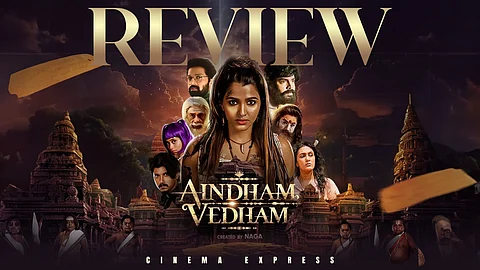Aindham Vedham Series Review: Interesting, albeit plot-heavy, blend of spirituality and science fiction
Aindham Vedham(2.5 / 5)
For centuries, the coincidence of religious scripts and predictions by spiritual leaders has played a significant role in mapping planetary movements and understanding the world and its people. Archaeological surveys have often shown the advancement of civilisation at a given time, especially in terms of the ability to master various skills, including the prediction of events from thousands of years down the road. Aindham Vedham, helmed by Naga, immerses its viewers in this realm by creating an ambitious web of stories surrounding the mystery of hidden secrets and their implications on the future of mankind.
Cast: Sai Dhanshika, Santosh Pratap, Vivek Rajagopal, YG Mahendran, Ponvannan, Krisha Kurup, Ramji, Devadarshini, and Mathew Varghese
Director: Naga
Streaming on: Zee5
Naga, known for creating the iconic 1990s series Marmadesam, is back with two projects this year. While one is the Panchayat remake Thalaivettiyaan Paalayam made to fit Tamil sensibilities, Aindham Vedham blends spirituality and science fiction in a complicated yet slightly mind-bending way that is just enough to leave you tantalisingly poised at the end of the first season.
In the story, we naturally follow Anu Panchamavedhi's (Dhanshika) reluctant mission to deliver an ancient sacred box to the priest in Ayangarpuram village. Anu goes there but, as fate would have it, she is denied by forces beyond her knowledge from leaving the area until the realisation of this prophecy: Four planets aligning in the same direction after 1000 years will create a miracle like never before when ‘four becomes five’.
What is fascinating about Aindham Vedham is that the series pieces itself like a treasure hunt, moving from one character and subplot to another, with compelling performances from Santhosh Pratap, YG Mahendran, Vivek Rajagopal, and Ponvannan steering it into the heart of Ayangarpuram. Interestingly, it also makes use of AI as a character that tries to prove its dominance on humans. Mithran (Vivek Rajagopal) is obsessed with Radhika, his AI girlfriend (I never thought I would write this) to the point that he believes that her human lookalike (Krisha Kurup) would too be as ‘crazy’ as her. His behaviour slightly slips to the problematic side when his obsession quickly takes a toxic turn. Moreover, his romantic portions take up way too much screen time even if his character is crucial in shifting gears in the story.
For the flamboyance and boldness she carries, Anu is surprisingly written with broad strokes. You wish she had more depth in her role. She is characterised as a hippie, free-spirited woman who shares a love-hate relationship with her father Visweswaran (Mathew Varghese). But we rarely get a glimpse of her heart. Even her anger and aversion towards solving the mystery surrounding the Fifth Veda don't serve as strong explanations for why she is the way she is. The series also often indulges in convenient writing choices to connect loose knots, even if it means inconsistent characterisation.
Naga is also self-aware of the limitations of the series. When the spirituality angle goes up by a notch, the filmmaker cuts it across with a joke or two, bringing in a much-needed sense of lightness to the intense plot. However, the problems enter the crevices of the house of secrets when Aindham Vedham pulls together spirituality and artificial intelligence in a singular path.
While there is a story surrounding Anu and her purpose in fulfilling what is given to her, the plot also focuses Mithran blindly following the route that AI carved for him, Pathi’s (Santhosh Pratap) quest to unravel the mysteries surrounding Lord Brahma, Ketaki's (Devadarshini) investigation about a stolen 3D printer, Natarajan's (Ponvannan) quest for a lost computer, a father and daughter’s religious visit, among other threads. Even as Naga weaves these individual stories together at Ayangarpuram, you can't help but feel lost about their connection until the final episode.
As if the plot-heavy story wasn't enough, the series keeps introducing new characters well past the halfway mark, which results in a labyrinthine screenplay. Adding to the complexities, we also traverse multiple timelines. When all the forces come together to place the characters and their purposes in a single line, the resulting convergence feels rushed, leaving little time to fully absorb the significance of events. The repeated usage of flashbacks and exposition weakens the story too.
Although these factors can lead to a frustrating watch, director Naga subtly places Easter eggs and twists to keep the engrossing factor going. But Aindham Vedham could have conjured up a tighter screenplay, runtime and a show-don’t-tell set up, to create a solid premise that potentially opens a portal to a succesful franchise in the future.

